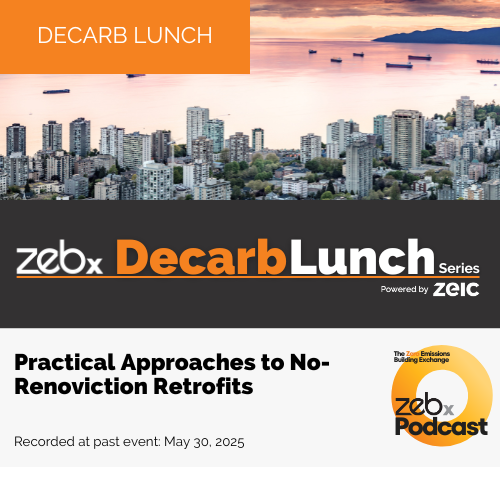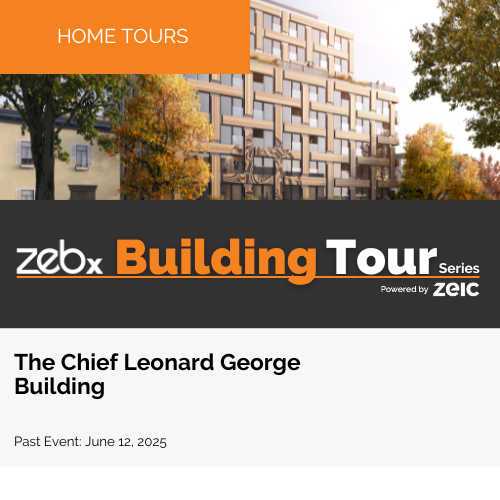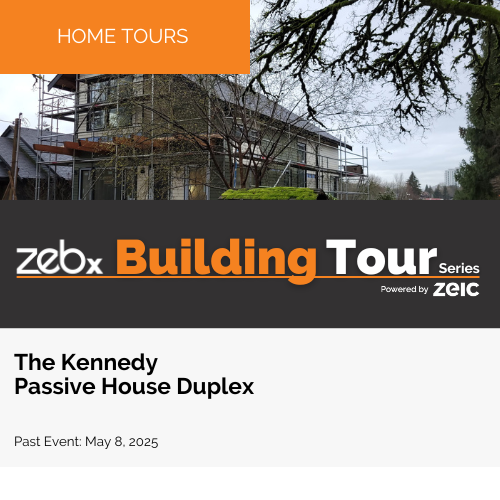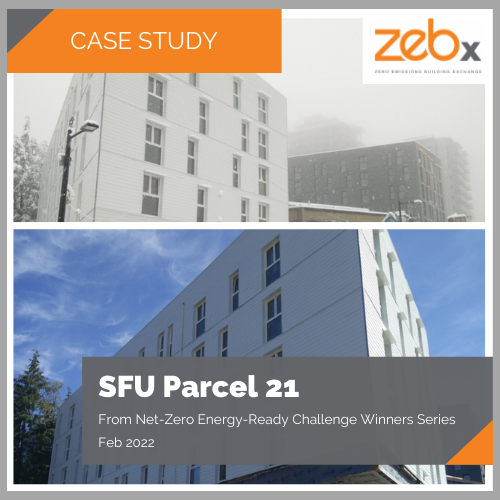
SFU Parcel 21
February 14, 2022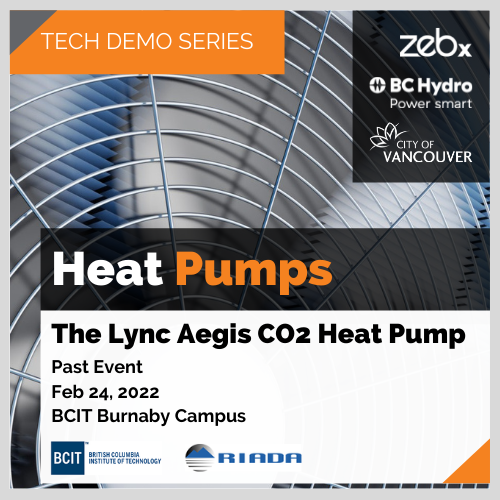
ZEBx & BCIT: Tech Demo Series – The Lync Aegis CO2 Heat Pump
February 25, 2022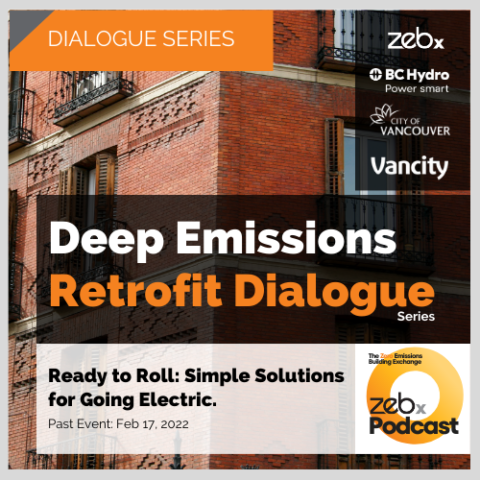
Deep Emissions Retrofit Dialogue Five – Ready to Roll: Simple Solutions for Going Electric
Recorded at Past Event: Feb 17, 2022
Slides:
Summary
The biggest source of future operational emissions from the building sector will come from existing, rather than newly constructed buildings. Retrofits which prioritize massive reductions in operational emissions are essential to address the climate crisis and help the Province and local governments achieve their emissions reduction goals. These kinds of retrofits will need to be scaled up dramatically over the next decade. In British Columbia, electrification is the most effective strategy to achieve deep, immediate, and real emissions reductions.
In this Deep Emissions Retrofit Dialogue, the fifth in a six-part series and a collaboration with B2E and HRAI, we focused on some electrification strategies that can be implemented relatively easily and quickly with technology that is readily available and well-proven.
The Case for Residential Hot Water Electrification
Presented by Peter Sundberg, City Green Solutions
Space and water heating make up most of a home’s emissions. Research conducted by City Green Solutions demonstrates that electrifying these systems can be both cost-effective and climate-friendly.
Standard and premium electric-resistance water heaters are readily available and less expensive than their gas counterparts. Hybrid heat pump water heaters (combining heat pump technology with electric resistance heating) are newer to the market and have a higher capital cost than standard electric resistance and gas-fired water heaters. Rebates are available to offset the additional purchase cost of hybrid heat pump water heaters. Since heat pumps are much more efficient than gas-fired or electric resistance water heaters, hybrid heat pump water heaters have significantly lower operational costs.
In fact, when City Green compared two gas-fired options and two electric-resistance options with a hybrid heat pump water heater, the hybrid heat pump water heater with a uniform energy factor of 3.5 provided the lowest 25-year lifecycle cost (purchase price, operational cost and maintenance cost). Rebates were not included in this comparison.
A similar comparison was made between cold-climate heat pumps (with a CoP of 2.9) and a gas furnace (AFUE 95) combined with 100% renewable gas offsets. Over 15 years, the lifecycle cost was comparable.
When fuel-switching, electrical capacity is an important consideration. The Canadian Electrical Code provides guidance on determining whether a panelboard has sufficient capacity to accommodate a new or larger electrical load. In some cases, the electrical service might not be sufficient to accommodate additional electrical load from an electric-resistance or hybrid heat pump water heater. For these situations, an electrical service upgrade would be required.
Electrification Opportunities for Multi-Unit Residential Buildings
Presented by Sofia Marmolejo and John Foster, FRESCo
For multi-unit residential buildings, central make-up air systems, central domestic hot water systems, and in-suite space heating are three simple electrification opportunities for decarbonization.
Of these three opportunities, electrification of a central make-up air system is the most economical on a per suite basis. The conversion doesn’t require access to the suites and provides the building, specifically the common areas, with cooling, which improves climate resilience. This conversion should include the addition of heat recovery and ventilation controls to reduce the energy demand. In Vancouver and Victoria’s climate zone (Climate Zone 4), no auxiliary heating is required.
The second-most cost-effective decarbonization strategy is electrification of a centralized domestic hot water system. A recommended prerequisite for this electrification project is the installation of high-efficiency plumbing fixtures (shower heads, faucet aerators, etc.). This would require access to the suites, but would not disrupt occupants in any significant way. The main consideration for this kind of electrification project is the additional space required for hot water storage.
Replacing gas-fired hydronic heating with in-suite heat pumps requires more coordination and planning. It is also more disruptive for occupants, but they are not required to move out for the project to take place. This is one of the main reasons that, for market-rental apartment buildings, this type of electrification project should be undertaken when tenants move out. To ensure that a small heat pump can be used for each suite, it’s important to reduce the heating and cooling load by improving the airtightness of the suite and the thermal performance of the building enclosure. A heat pump that incorporates heat recovery also helps reduce the energy consumed by the heating and cooling system.
Again, consideration must be given to the electrical capacity of both the suite’s panelboard and the building’s electrical service capacity.
Solutions for Small Commercial Buildings
Presented by Christy Love, RDH
RDH Building Science managed a pilot project for the Northwest Energy Efficiency Alliance (between 2014 and 2019) which included eight small commercial buildings. Each project consisted of replacing a conventional, gas-fired, packaged, rooftop unit with a heat or energy recovery ventilator and a heat pump for heating and cooling. This decoupling and electrification approach allowed for two much smaller systems which, in turn, reduced energy consumption and emissions. Measurement and verification following the projects indicated that HVAC energy savings ranged from 48% to 89% and total emissions reductions ranged from 14% to 90%.
It’s important to note that the mechanical contractors that were asked to bid on the work often based their quotes on the capacity of the old equipment. This is very typical in industry. Had similarly sized equipment been installed, the capital cost would have been higher and the energy and emissions reductions would have been less. When the projects took place, mechanical options were very limited. Since then, the market has expanded and there are many more solutions available.
For more information on this pilot project and the lesson learned, check out our B2E case study.
Presenters
Peter Sundberg, Executive Director, City Green Solutions
City Green Solutions is a social enterprise that provides a wide range of residential and small commercial energy efficiency programs and services, including energy coaching services, virtual home energy check ups, program development and development and delivery, marketing and promotional services, research, training and capacity building services. City Green is also a licensed Service Organization for the EnerGuide Rating System (new and existing homes). Peter is a house-as-a-system and building science specialist that specializes in energy service business development, research, training and capacity building, and building awareness about the full value and benefits of energy efficient and low carbon homes and buildings.
John Foster, Senior Energy Engineer, FRESCo
John is a Professional Engineer with a passion for making housing healthy, affordable and reducing GHG. John has completed over 300 energy studies in multi-family buildings, including social housing, low-income rental apartments and housing Co-ops. He has a focus on heat pumps retrofits and has led or participated in many overview and case studies for clients including Fortis, BC Hydro the Province of BC and LandLordBC. John has enjoyed living in apartment buildings for all his adult life and has participated on the board and maintenance committee.
Sofia Marmolejo, Energy Efficiency Engineer, FRESCo
Sofia is a mechatronics Professional Engineer with a holistic background in mechanical, electrical and controls systems. Her experience has led her to gain technical expertise through the design and project management in a wide range of building types. Sofia has recently worked in many multi-unit residential building energy assessments and electrification projects across BC as well as research and feasibility studies looking at retrofitting heat pumps and hybrid (electric-gas) systems. She also has enjoyed supporting the industry by volunteering for local groups such as the Canada Green Building Council (CaGBC), BC Sustainable Energy Association (BCSEA) and the Division for the Advancement of Women in Engineering (DAWEG).
Christy Love, Senior Project Engineer, RDH
Christy’s work places an emphasis on efficient building systems, research, and sustainability. For the past 20 years she has been designing, evaluating, and researching energy-, carbon- and water-efficient solutions for the built environment. Her current focus is improving the performance of existing buildings through applied research, and supporting the development of related policy and programs.
Hosts
Mariko Michasiw, B2E Program Manager, ZEBx
Victoria Cross, BC Lead, HRAI




